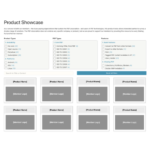Milestones in the History of PDF
PDF in the WildOctober 22, 2025
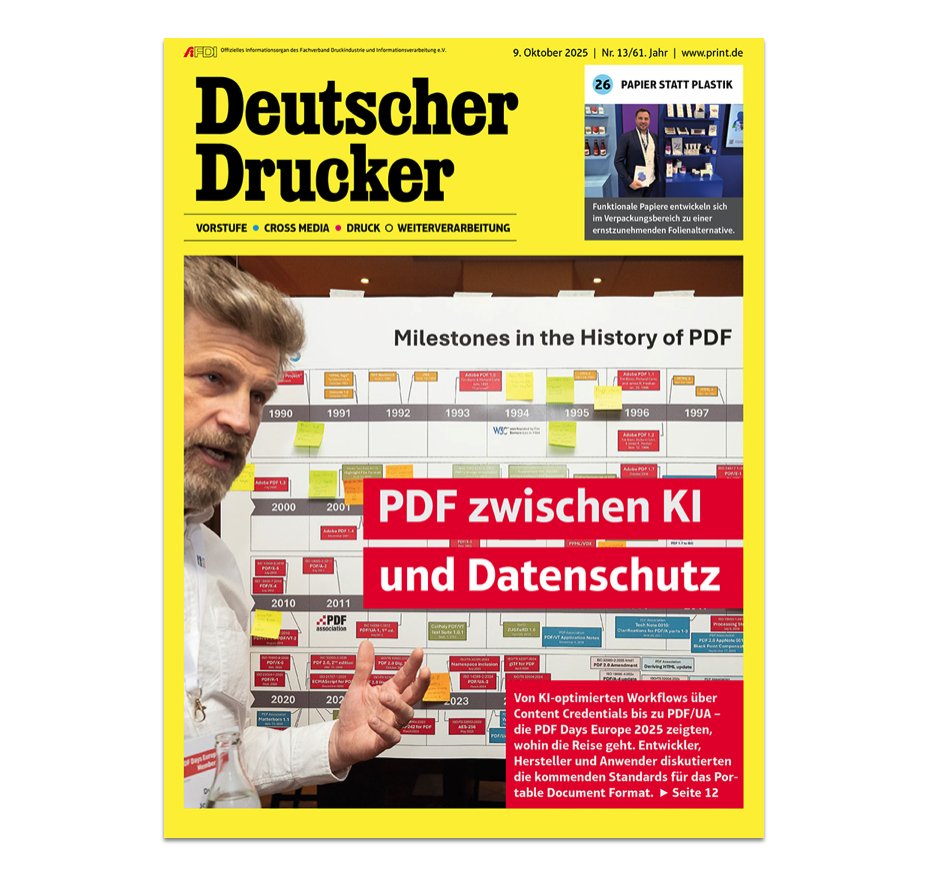

PDF in the WildOctober 22, 2025
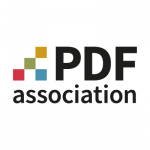
About PDF Association staff
“Milestones in the History of PDF” gets covered
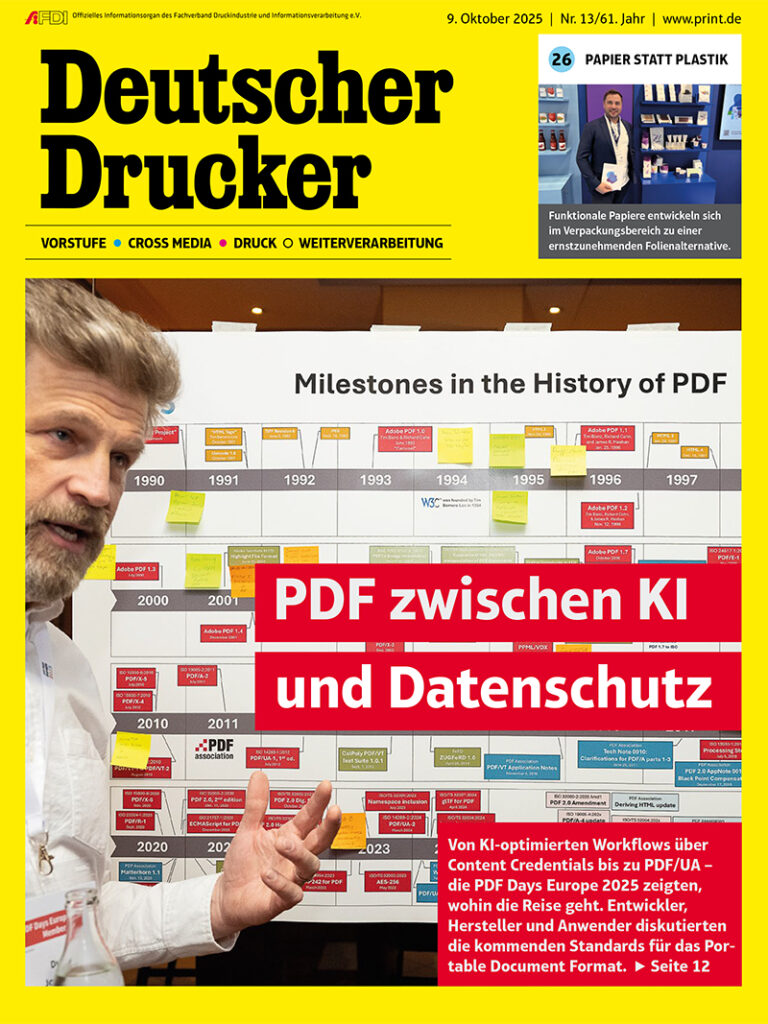 Deutscher Drucker magazine covered PDF Days Europe 2025 in September. Of our event they said: “PDF Days Europe shows where PDF is heading”.
Deutscher Drucker magazine covered PDF Days Europe 2025 in September. Of our event they said: “PDF Days Europe shows where PDF is heading”.
The magazine also put Peter Wyatt's great "Milestones in the history of PDF" poster on its cover!
Unfortunately some guy is standing in the way so you can't see the whole thing.
JPEG 2000 turns 25!
To mark the 25th anniversary of JPEG 2000, the Digital Preservation Council (DPC) is hosting a free and open event to recognize the role that this significant standard has played in many digitization and digital preservation projects over the past quarter century.
Implemented as the JPXDecode filter in PDF, JPEG 2000 is the most capable imaging format currently used in PDF, with up to 38 bits/sample, opacity and premultiplied opacity channels, and advanced color spaces.
Chrome’s newest feature not shiny on PDF
The latest Chrome (Version 141.0.7390.67 for the Mac) introduces a new “read pages aloud” feature. The company’s announcement on the What’s New in Chrome page notes that “Read aloud is best for content like news stories, articles, or even PDFs.” (emphasis added).
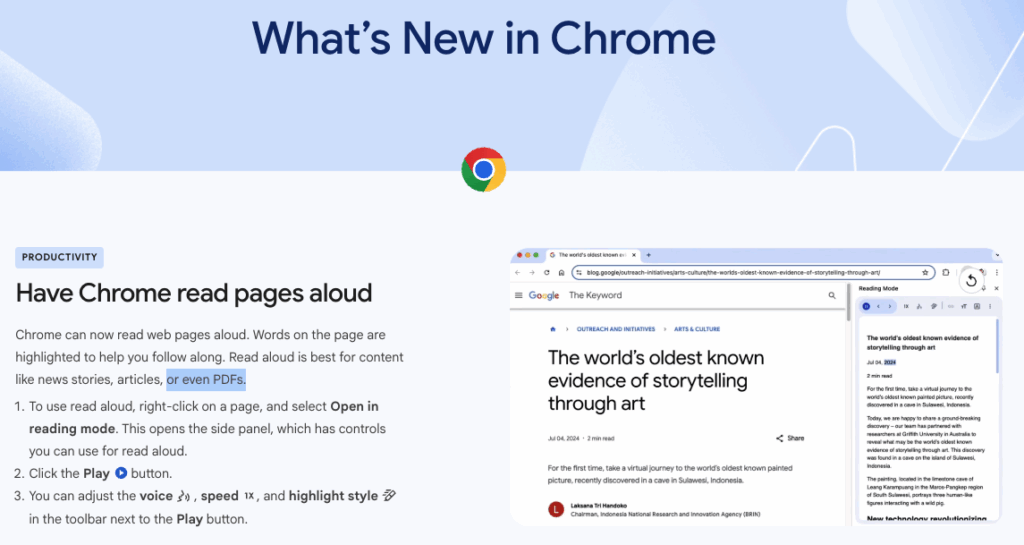
We used a simple test PDF to investigate whether Chrome was using Tagged PDF to read, or was just scraping the text. Sadly, thus far, it’s just scraping (and ignoring annotations).
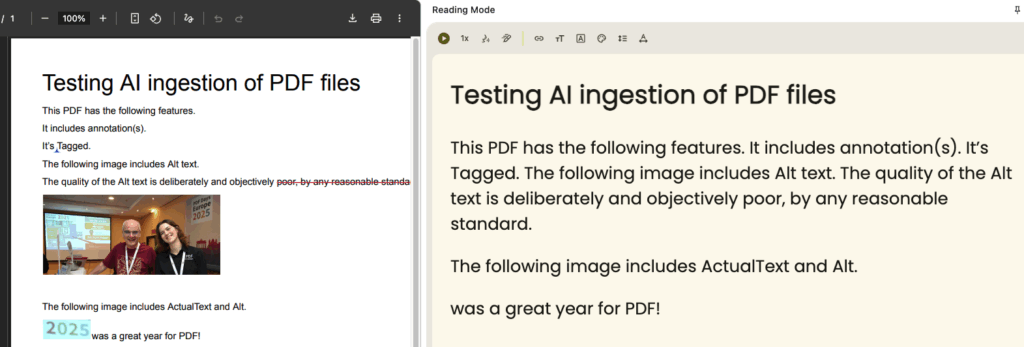
Windows 11 October 2025 update breaks PDF preview capabilities
It has been widely reported (here and here) that the latest Windows 11 mid-October 2025 update silently blocked the PDF preview capabilities of Windows File Explorer, replacing the non-interactive rendered page preview with a security message. The same update also blocks the preview of Office documents.

Unless there is a major vulnerability underlying this change (we can find no evidence to support this), this unfortunate loss of the preview feature simply reduces the information available to users.
Passive non-interactive rendering of pages from a PDF document can be done entirely without processing any of the advanced interactive features commonly associated with vulnerabilities - such as OpenActions or JavaScript. This is what non-interactive processors such as raster image processors in printers (such as those powered by GhostScript) do! Various technical workarounds have been documented for those needing to restore PDF preview capabilities.
Vulnerabilities are caused by – and exist in – implementations, not files. The DARPA-funded SafeDocs research project applied formal methods to create provably correct PDF parsers so technology is widely available - including F* and EverParse technologies from Microsoft Research! Such technologies can create provably correct and robust PDF preview parsers.
Of course, users can install a preview handler from another vendor which may process additional features or enable interactive functionality in the preview pane, but this may unwittingly expose users.
But for simple static page preview renderings, the removal of this preview capability in Windows 11, is a major usability setback for many users who depend on basic preview capabilities to efficiently identify specific PDF documents in their vast document libraries.
ETSI announce third “AI and Data Conference 2026”
The third “ETSI AI and Data Conference - Bringing AI and data together” will take place face-to-face on 09-11 February 2026, in ETSI premises, Sophia Antipolis, France. The event is free of charge and open to all upon registration
In the PDF ecosystem, ETSI is most commonly associated with PAdES electronic signatures (as defined by ETSI EN 319 142), however through it’s formal liaison with ETSI the PDF Association makes all ETSI information available to members. Standardisation Requests in support of the EU AI Act and the EU Data Act, means that standards development organizations (SDOs) such as ETSI, and thus indirectly via the PDF Association, actively contribute to EU policy.
Focusing exclusively on AI in the past, ETSI has extended the conference scope in 2026 to intertwine AI and Data management technologies. The event will also feature demonstrations and posters on the latest advances in the field of Artificial Intelligence (AI) and Data being applied to networks, digital systems and vertical sector applications, with the call for demos and posters now open until November 9, 2025.
ICC v4.4 specification becomes ISO 15076-1:2025
The latest edition of the ISO standard for ICC.1 v4.4 color profiles, ISO 15076-1:2025, was published by ISO this month. This edition replaces ISO 15076-1:2010 which replaced ISO 15076-1:2005 (both now officially withdrawn by ISO but still available from the ICC on request). The 2025 edition includes the following changes:
- cicpTag has been added to enable HDR metadata to be carried in a profile;
- metadataTag and dictType have been added to enable flexible definition of additional metadata;
- it has been clarified that PCSXYZ values can be negative;
- Tag tables are now required to define a contiguous sequence of unique tag elements, with no gaps;
- parametricCurveType functions in Table 69 have been corrected;
- informative Annex B content on embedding profiles has been replaced with a reference to an ICC Technical Note;
- informative Annex E on chromatic adaptation has been updated;
- the Bibliography and normative references have been updated.
OpenAI ChatGPT Atlas learns from ARIA semantics
OpenAI has just launched ChatGPT Atlas – a new web browser with ChatGPT built-in (currently only available for Mac users). What stood out to us was this Developer FAQ on ARIA tags link from the final paragraph of the announcement:
ChatGPT Atlas uses ARIA tags—the same labels and roles that support screen readers—to interpret page structure and interactive elements. To improve compatibility, follow WAI-ARIA best practices by adding descriptive roles, labels, and states to interactive elements like buttons, menus, and forms. This helps ChatGPT recognize what each element does and interact with your site more accurately.
We can only hope that the inclusion of ARIA semantics in HTML content means that support for PDF semantics (Tagged PDF) is also not too far away!
PDFacademicBot for October 2025
Bryhynets, A. et al. (Sept. 2025) “Random Forest Approach for PDF Malware Detection,” Baltic Journal of Modern Computing, 13(3), pp. 694–719. https://doi.org/10.22364/bjmc.2025.13.3.08.
Chowdhury, A.M.M.M.I. et al. (July 2025) “Detecting Evasive PDF Malware: A Comparative Analysis of Advanced Machine Learning Approaches,” in 2025 International Conference on Quantum Photonics, Artificial Intelligence, and Networking (QPAIN). 2025 International Conference on Quantum Photonics, Artificial Intelligence, and Networking (QPAIN), pp. 1–6. https://doi.org/10.1109/QPAIN66474.2025.11172009.
Gregory Slager (June 2025) WCAG compliance of Dutch open government documents. research at the state of the WCAG compliance of government documents released under the Dutch Open Government Act. Master of Information Studies, Data Science. University of Amsterdam. https://wooverheid.nl/wp-content/uploads/2025/07/msc_is_thesis_gregoryslager.pdf.
Heseltine, J. (Sept. 2025) Suitability of large language models for making PDF-documents more accessible and barrier-free in enterprise content management / Author Jack Heseltine. Masters of Science (AI). Johannes Kepler Universitat Linz. http://epub.jku.at/obvulihs/12667816
Naresh, M.L. et al. (2025) “Scalable Document Query Assistant Using Ai and Cloud-Based Infrastructure,” in 2025 9th International Conference on Inventive Systems and Control (ICISC). 2025 9th International Conference on Inventive Systems and Control (ICISC), pp. 810–815. https://doi.org/10.1109/ICISC65841.2025.11187461.
Petrenko, M. and Boyko, M. (May 2025) “Towards the Automation of Scientific Publications Processing: Generating OWL Files from PDF Documents,” in Workshop on Software engineering and semantic technologies. 15th International Scientific and Practical Programming Conference UkrPROG’2025, Kyiv, Ukraine: CEUR Workshop, p. 15. https://ceur-ws.org/Vol-4053/paper8.pdf.
Pineo, E. (October 2025) “‘The original PDF score is just completely inaccessible’: A Proposed Workflow for Making Archival Music Scores Accessible Using MEI,” Proceedings of the Association for Information Science and Technology, 62(1), pp. 1640–1642. https://doi.org/10.1002/pra2.1493.
Panaretos, N. and Quadros, N. (October 2025) “Kill the PDF: Moving Urban Planning Beyond Static Tools.,” Planning News (1329-2862), 51(5), p. 18. https://openurl.ebsco.com/contentitem/gcd:188542206?sid=ebsco:plink:crawler&id=ebsco:gcd:188542206
Rochmatullah, A.N. and Wibowo, I.A. (October 2025) “Enhancing The Security of E-Invoicing for Distribution Companies Through Image-Based PDF Conversion and QR Verification,” Journal of Applied Informatics and Computin, 9(5), pp. 2068–2075. https://jurnal.polibatam.ac.id/index.php/JAIC/article/download/9974/3033
Seth, A. et al. (October 2025) “A Multilingual PDF Text-to-Speech Converter with Translation Capabilities,” in D. Giri et al. (eds.) Proceedings of International Conference on Network Security and Blockchain Technology. Singapore: Springer Nature, pp. 91–105. https://doi.org/10.1007/978-981-96-6348-4_8.
Sinha, A.G. et al. (October 2025) “Optimizing Cybersecurity Defenses: Leveraging YARA Rules for Enhanced Detection of Custom PDF Spyware,” in D. Giri et al. (eds.) Proceedings of International Conference on Network Security and Blockchain Technology. Singapore: Springer Nature, pp. 65–77. https://doi.org/10.1007/978-981-96-6348-4_6.
Usha, Shahapure, N.H. and Sadashiv, N. (July 2025) “Intelligent Document Query Hub — A Holistic Solution for Efficient PDF Information Retrieval and Extraction,” in 2025 3rd International Conference on Data Science and Network Security (ICDSNS). 2025 3rd International Conference on Data Science and Network Security (ICDSNS), pp. 1–7. https://doi.org/10.1109/ICDSNS65743.2025.11168794.
Zamen Mohsmmed Sahan and Amer Abdulmajeed Abdulrahman (2024) “PDF Malware Detection Based on Deep Learning Techniques,” in Proceedings of International Conference on Artificial Intelligence and Networks: ICAIN 2024. Springer Nature, p. Pp.271-283. https://books.google.com.au/books?id=zR2LEQAAQBAJ&newbks=0&printsec=frontcover&pg=PA271&dq=PDF&hl=en&redir_esc=y#v=onepage&q=PDF&f=false.

